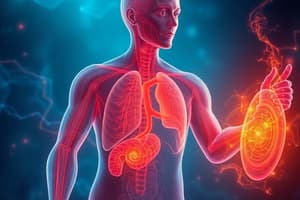Podcast
Questions and Answers
What is an important lifestyle change that can help manage essential hypertension?
What is an important lifestyle change that can help manage essential hypertension?
- Increased alcohol consumption
- Sedentary lifestyle
- Moderate physical activity (correct)
- High sodium intake
Which of the following is a key reason why adherence to treatment is important in managing hypertension?
Which of the following is a key reason why adherence to treatment is important in managing hypertension?
- Hypertension has clear and noticeable symptoms.
- Nonadherence can lead to complications. (correct)
- Long-term treatment is rarely necessary.
- Hypertension is typically not a serious health issue.
Which statement correctly describes the role of stress in relation to essential hypertension?
Which statement correctly describes the role of stress in relation to essential hypertension?
- Stress has minimal impact on blood pressure.
- Stress is irrelevant to the development of hypertension.
- Stress can lower blood pressure in most cases.
- Stress can lead to an increase in blood pressure. (correct)
What is a common reason for nonadherence in hypertensive patients?
What is a common reason for nonadherence in hypertensive patients?
Which lifestyle factor is associated with a higher risk of essential hypertension?
Which lifestyle factor is associated with a higher risk of essential hypertension?
What is one of the goals of managing essential hypertension?
What is one of the goals of managing essential hypertension?
Which of the following pharmacological therapies is commonly used in hypertension treatment?
Which of the following pharmacological therapies is commonly used in hypertension treatment?
What environmental factor can contribute to the development of essential hypertension?
What environmental factor can contribute to the development of essential hypertension?
Which of the following factors is least likely to contribute to the development of essential hypertension?
Which of the following factors is least likely to contribute to the development of essential hypertension?
Which is the most comprehensive strategy for improving adherence to hypertension treatment?
Which is the most comprehensive strategy for improving adherence to hypertension treatment?
Which personality trait is most associated with an increased risk for developing hypertension?
Which personality trait is most associated with an increased risk for developing hypertension?
What is a potential consequence of nonadherence to prescribed antihypertensive medications?
What is a potential consequence of nonadherence to prescribed antihypertensive medications?
What type of physical activity is considered most beneficial for managing essential hypertension?
What type of physical activity is considered most beneficial for managing essential hypertension?
Which of the following pharmacological treatments is categorized as an ACE inhibitor?
Which of the following pharmacological treatments is categorized as an ACE inhibitor?
How does stress management affect patients with essential hypertension?
How does stress management affect patients with essential hypertension?
In a healthcare context, which approach can enhance the management of essential hypertension?
In a healthcare context, which approach can enhance the management of essential hypertension?
What is the primary role of dietary modifications in managing essential hypertension?
What is the primary role of dietary modifications in managing essential hypertension?
Which of the following lifestyle changes is least likely to support hypertension management?
Which of the following lifestyle changes is least likely to support hypertension management?
Flashcards are hidden until you start studying
Study Notes
Definition and Prevalence
- Essential hypertension is characterized by persistent high blood pressure without a single identifiable cause.
- It is responsible for 95% of all hypertension cases and is strongly linked to serious health conditions like stroke and heart failure.
- Approximately 24% of adults in the US are either hypertensive or on medication for hypertension.
- Prevalence is influenced by ethnicity, age, gender, and socioeconomic factors.
Genetic and Environmental Factors
- Key factors contributing to increased blood pressure include genetics, obesity, alcohol consumption, aging, inactivity, stress, high sodium intake, and low calcium and potassium levels.
- Research indicates a genetic predisposition to hypertension found within families.
- The interplay between genetic factors and environmental conditions significantly impacts the risk of developing essential hypertension.
Role of Stress and Behavior
- Behavioral and social factors, including dietary habits and physical activity, are important risk determinants.
- Chronic exposure to stress can elevate blood pressure levels.
- Personality traits such as suppressed anger, hostility, and anxiety may contribute to the risk of developing hypertension.
Treatment
- The primary goal of managing essential hypertension is to reduce risks associated with cardiovascular diseases and improve overall health outcomes.
- Recommended lifestyle modifications include weight loss, physical activity, reduced alcohol intake, dietary changes, and stress management techniques.
- Common pharmacological options include diuretics, beta-blockers, ACE inhibitors, and calcium channel blockers.
- Integration of weight loss strategies, exercise, dietary changes, and cognitive interventions can enhance treatment effectiveness.
Adherence to Treatment
- Nonadherence is prevalent due to the often asymptomatic nature of hypertension and potential side effects from medications.
- Cost of medications and practicality of once-a-day regimens can influence adherence.
- A collaborative healthcare approach with community and family support can significantly improve patient adherence to treatment protocols.
Conclusion
- Essential hypertension poses serious health risks with various accessible management strategies.
- Effective management requires comprehensive understanding of genetic, environmental, and behavioral factors.
- Long-term control relies on adherence to treatment protocols and sustained lifestyle changes.
Definition and Prevalence
- Essential hypertension is characterized by persistent high blood pressure without a single identifiable cause.
- It is responsible for 95% of all hypertension cases and is strongly linked to serious health conditions like stroke and heart failure.
- Approximately 24% of adults in the US are either hypertensive or on medication for hypertension.
- Prevalence is influenced by ethnicity, age, gender, and socioeconomic factors.
Genetic and Environmental Factors
- Key factors contributing to increased blood pressure include genetics, obesity, alcohol consumption, aging, inactivity, stress, high sodium intake, and low calcium and potassium levels.
- Research indicates a genetic predisposition to hypertension found within families.
- The interplay between genetic factors and environmental conditions significantly impacts the risk of developing essential hypertension.
Role of Stress and Behavior
- Behavioral and social factors, including dietary habits and physical activity, are important risk determinants.
- Chronic exposure to stress can elevate blood pressure levels.
- Personality traits such as suppressed anger, hostility, and anxiety may contribute to the risk of developing hypertension.
Treatment
- The primary goal of managing essential hypertension is to reduce risks associated with cardiovascular diseases and improve overall health outcomes.
- Recommended lifestyle modifications include weight loss, physical activity, reduced alcohol intake, dietary changes, and stress management techniques.
- Common pharmacological options include diuretics, beta-blockers, ACE inhibitors, and calcium channel blockers.
- Integration of weight loss strategies, exercise, dietary changes, and cognitive interventions can enhance treatment effectiveness.
Adherence to Treatment
- Nonadherence is prevalent due to the often asymptomatic nature of hypertension and potential side effects from medications.
- Cost of medications and practicality of once-a-day regimens can influence adherence.
- A collaborative healthcare approach with community and family support can significantly improve patient adherence to treatment protocols.
Conclusion
- Essential hypertension poses serious health risks with various accessible management strategies.
- Effective management requires comprehensive understanding of genetic, environmental, and behavioral factors.
- Long-term control relies on adherence to treatment protocols and sustained lifestyle changes.
Studying That Suits You
Use AI to generate personalized quizzes and flashcards to suit your learning preferences.




